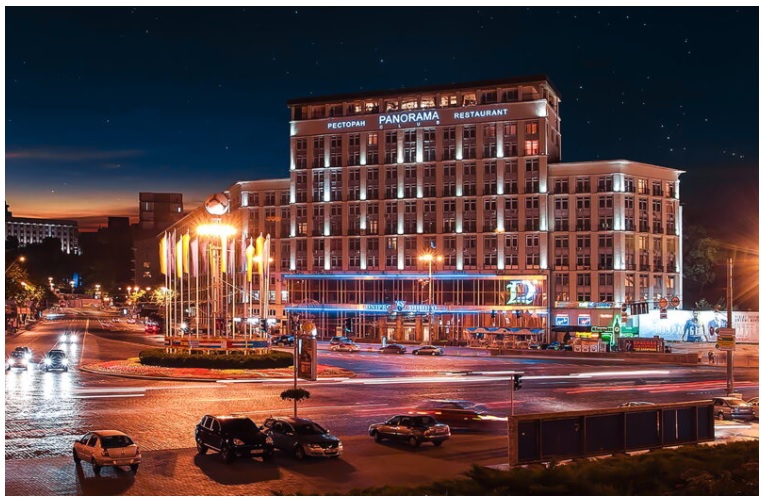Ukraine’s long-awaited large-scale privatization has officially begun.
On July 15, the state-owned four-star Dnipro Hotel, located in the Kyiv city center, was sold for $41 million to a private investor through the ProZorro online procurement platform.
The final sale price was almost 13 times higher than the initial price, with 29 participants submitting their offers in the open bidding. And the auction ended with a surprise: the winner, a dark horse Ukrainian company called Smartland, paid only $4 more than the runners-up.
The 56-year-old Soviet-era hotel, located just a short walk from the Dnipro River, stands at the very beginning of Khreshchatyk Street on Evropeiska Square. At 13,000 square meters, it features 186 rooms, restaurants, bars, a spa center and several conference rooms. And officials say it would be the perfect site to open a gambling hall, which was legalized a day earlier.
The Dnipro Hotel was among the first five state-owned objects put up for privatization by President Volodymyr Zelensky in 2019. Before the hotel was transferred to the State Property Fund to be sold off, it belonged to the State Management of Affairs agency.
“The hotel will receive a new life,” said Dmytro Sennychenko, head of State Property Fund. Some of the rooms had not been renovated in 50 years, the fund noted. “Ukraine should make a choice and leave only truly strategic enterprises state-owned,” Sennychenko added.
Reasons for privatization
After the auction, the Dnipro is more than a hotel. Now it is an “important gesture” aimed at attracting more private investment into the Ukrainian economy, according to Inga Ioanno, spokesperson for the State Property Fund.
But the privatization also serves a practical purpose: making the hotel more efficient, which may bring more tax income into the state budget in the future.
“The hotel was a burden on the state,” said Ioanno. “The decision to put it up for privatization was right, as it was a non-core asset which had to be transferred to a competent investor.”
In 2019, the hotel made just around $11,000, the Novoye Vremya news site reported.
“This profit was laughable,” Sennychenko wrote in a column for the Evropeiska Pravda news site.
The best way to fix that problem was a transparent auction, where “every investor, whether Ukrainian or foreign, can participate and win,” Ioanno said.
Within the next 10 days, the Ukrainian government will check the buyer’s financial documents to ensure that the money to purchase the hotel was legally obtained. Within the next 30 days, the purchase agreement will be signed with the new owner.
Ultimately, the government may get more than $41 million for the Dnipro Hotel. The day before the auction, Ukraine’s parliament passed a law legalizing the gambling business in the country, allowing bookmakers to work at three-, four- and five-star hotels. That has the potential to bring over $160 million into the state budget in the coming year.
“As of today, it is the best location and the hotel meets all the criteria of this law for opening a gambling hall,” said Ioanno.
New owner, surprising details
But while the privatization auction was a runaway success, the hotel’s new owner raises a few questions.
The Smartland company is virtually unknown. It is legally registered at a rundown private house just outside Kyiv in the town of Brovary. Seventeen percent of the company’s shares belong to Maksym Tereshchuk and the rest belong to the Ice Town company of Oleksiy Igunin.
Just days before the auction, on July 11, Ice Town acquired the majority share in Smartland, according to the YouControl database of legal entities.
An online search did not reveal any additional information about either of these companies, their owners or their activities. The Kyiv Post was also unable to find the owners on social media.
When a Kyiv Post journalist called the phone number for Smartland listed on You Control, the answer was more than unexpected: It was the personal number of a Kyiv resident, Kateryna Shipulina, and she was not happy.
“Are you mocking me?” she asked. “I received five phone calls today. This has not happened before.”
The Hotel Ukraina, overlooking the Maidan, is to be the next state-owned hotel to go up for sale. First, government lawyers have to break several legal “poison pills” that make the property unattractive to outside investors. Sennichenko, of the state property fund, said that last year Ukraine’s 3,000 state enterprises caused the government losses of $6.3 billion.
